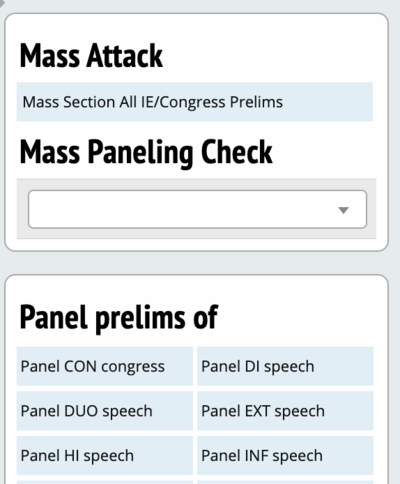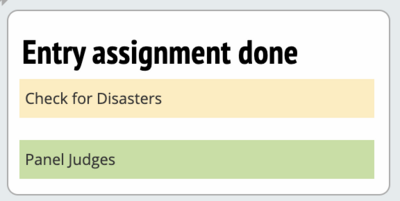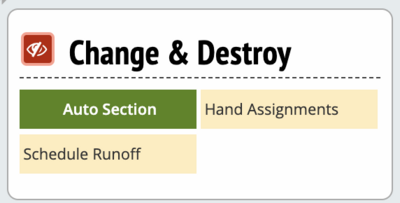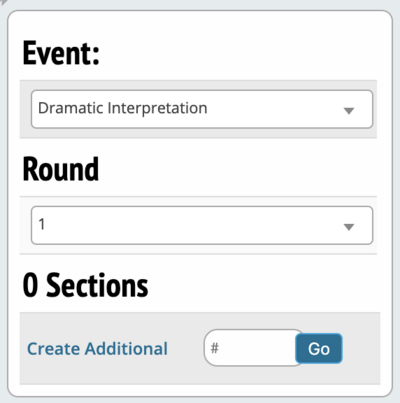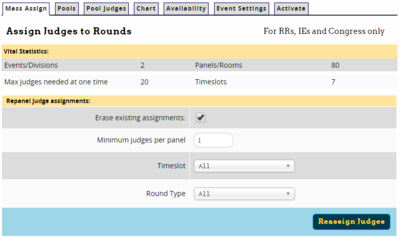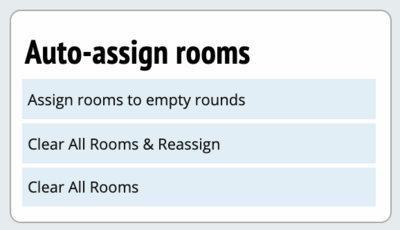Pairing Rounds: Difference between revisions
Created page with "Pairing/Paneling rounds is done differently depending on the event type. Speech events are paneled using the "Paneling" menu, while Debate events are paired using the Schemats..." |
No edit summary |
||
| Line 64: | Line 64: | ||
[[File:tabs_paneling_rooms.png|right|400px]] | [[File:tabs_paneling_rooms.png|right|400px]] | ||
If you didn't auto-assign rooms during the paneling step, you can assign rooms to a speech event using the "Rooms" menu option, and then choosing a timeslot on the sidebar. The "Mass Assign" tab will show you a listing of current assignments, and the option to auto-assign the rooms in that timeslot: | |||
[[File:panel_room_index-timeslot.png|400px]] | |||
[[File:panel_room_index-auto.png|400px]] | |||
The Paneling -> Rooms menu option is also where you configure Room Pools. For more information on setting up Room Pools, see the section of the manual on [[Sites & Rooms]]. | |||
Once you've assigned rooms, there are a few other helpful tabs with room information. The "Chart" tab will show you which rounds are assigned to each room: | |||
[[File:panel_room_chart.png|400px]] | |||
The "Report" tab will give you detailed information about each room, including which rounds it's being used, and which room pools it's in. | |||
The "Reservations" tab lets you designate a room for a particular judge. Note that this will make the room unavailable to any other judge, even if the judge it's reserved for isn't judging that round: | |||
[[File:panel_room_reserve.png|400px]] | |||
=== Paneling Speech Elims === | |||
=== Manipulating Speech Pairings === | |||
=== Publishing And Printing Speech === | |||
For Speech | |||
[[File:tabs_paneling_publish.png|right|400px]] | [[File:tabs_paneling_publish.png|right|400px]] | ||
[[File:tabs_paneling_reports.png|right|400px]] | [[File:tabs_paneling_reports.png|right|400px]] | ||
== Pairing Debate Events == | == Pairing Debate Events == | ||
Revision as of 23:05, 22 February 2015
Pairing/Paneling rounds is done differently depending on the event type. Speech events are paneled using the "Paneling" menu, while Debate events are paired using the Schemats menu. Speech events also typically panel all prelim rounds in advance, while Debate events usually only preset some of the rounds.
Before you proceed to pairing rounds, you should double check all of your tournament settings, especially the schedule. You should also look through your entries and judges for any possible problems, such as an event with too few judges, or a judge that was accidentally entered twice.
Paneling Speech Events
Paneling speech events is mostly done using the "Paneling" menu. You can choose whether to panel all events at once or one at a time, and whether to automatically assign rooms when you panel the round, or separately afterwards. You also have the option of whether to panel all prelim rounds at the same time, or you can panel each round one at a time.
Paneling Speech Prelims
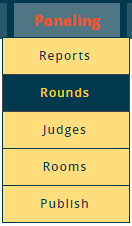
To get started paneling prelims in Speech, use the "Rounds" menu item. You will then be given the option to panel all speech events at once (recommended), or one at a time:
If you choose the "Mass Attack" option, you will see a list of events, where you can choose the number of sections to create. Tabroom will try to evenly distribute entries through the number of sections you choose - so the more sections you use, the smaller the average section size will be.
Make sure the "Do?" column is checked for each event you want to panel, and choose whether to let Tabroom auto-assign rooms at the same time, then click "Panel All Events."
You will then see a progress report on the screen as Tabroom panels each round. When finished, you will be given the option to run a disaster check (explained in more detail below), or proceed to paneling judges:
If instead of "Mass Attack," you choose to panel a single event, you will see a similar screen that lets you choose the number of sections to use for each round:
If you need more control over the pairing process, you also have the option of paneling only a single round, direct from the schematic. Use the Schemats menu to view the round you want to pair, then select "Panel this round only" from the sidebar to automatically panel that round. If you instead first create the number of sections you want to use with the "Create additional sections" box, the auto-paneler will split up students into that number of sections.
Your final option for paneling is to manually create the panels yourself. In most situations, this is unnecessary and more prone to error than using the automatic paneler, but is available if you need it. To use, view the round you want to panel in the Schematics menu, then choose "Manually panel round" from the sidebar:
Choose how many panels to create, then click Go. You will then be given a list of entries in the event, and will be asked to choose which panel each entry should be assigned to:
Assign Speech Judges
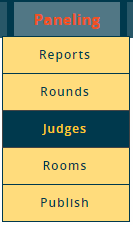
Once you have created the panels for an event (either all at once or one at a time), you can proceed to assigning judges, using the "Judges" menu option. Then, choose a judge group from the sidebar.
The "Mass Assign" tab lets you assign judges to all events in a judge group at once.
It will show you some statistics about the judge group, then let you choose whether to erase the existing judge assignments, and how many judges should be on each panel (in prelims, this is usually 1). You can then choose whether to assign judges in all time slots and to all rounds, or just a subset, and click "Reassign Judges."
You will then see a progress report as Tabroom tries to assign the judges, Once it's finished, you'll see a message that judge assignments are done, and links to view a disaster check or a chart of judge assignments:
Once your judges are assigned, the Judges menu option also has a number of helpful tabs. The "Chart" tab shows a list of all judges and their assignments for each round:
The "Availability" tab shows you the total number of judges you have available in each round, and the "Activate" tab lets you quickly active/deactivate judges in the judge group all in one place.
The Judges menu option is also where you configure Judge Pools for all events, including Debate events. For more information on judge pools, see the section of the manual on Judge Groups.
Assign Speech Rooms
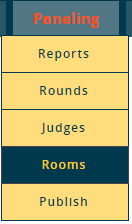
If you didn't auto-assign rooms during the paneling step, you can assign rooms to a speech event using the "Rooms" menu option, and then choosing a timeslot on the sidebar. The "Mass Assign" tab will show you a listing of current assignments, and the option to auto-assign the rooms in that timeslot:
The Paneling -> Rooms menu option is also where you configure Room Pools. For more information on setting up Room Pools, see the section of the manual on Sites & Rooms.
Once you've assigned rooms, there are a few other helpful tabs with room information. The "Chart" tab will show you which rounds are assigned to each room:
The "Report" tab will give you detailed information about each room, including which rounds it's being used, and which room pools it's in.
The "Reservations" tab lets you designate a room for a particular judge. Note that this will make the room unavailable to any other judge, even if the judge it's reserved for isn't judging that round:
Paneling Speech Elims
Manipulating Speech Pairings
Publishing And Printing Speech
For Speech
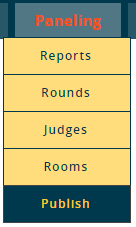
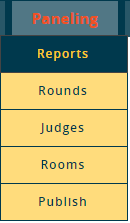
Pairing Debate Events

